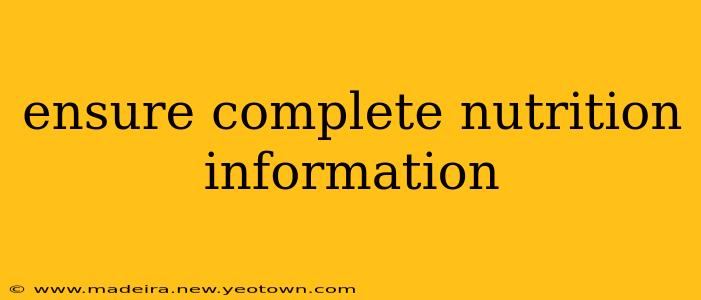Ensuring Complete Nutrition: A Journey to Well-being
We all crave that feeling of vibrant health, that effortless energy that allows us to tackle our days with gusto. But achieving this often feels like chasing a moving target. The truth is, true well-being hinges on one crucial element: complete nutrition. This isn’t just about eating enough calories; it’s about fueling your body with the precise mix of nutrients it needs to thrive. This journey starts with understanding what constitutes complete nutrition and how to incorporate it into your daily life.
Let's embark on this journey together, exploring the key aspects of ensuring complete nutrition and answering some common questions along the way.
What are the essential nutrients for complete nutrition?
Complete nutrition encompasses a balanced intake of all essential nutrients. Think of it as a carefully orchestrated symphony of vitamins, minerals, macronutrients (carbohydrates, proteins, and fats), and micronutrients working in harmony to keep your body functioning optimally. Each nutrient plays a vital role, and a deficiency in even one can disrupt this delicate balance, potentially leading to health issues. For instance, a lack of iron can cause anemia, while insufficient calcium can weaken bones. A varied diet rich in fruits, vegetables, whole grains, lean proteins, and healthy fats is crucial for obtaining all these essential nutrients.
How can I ensure I'm getting all the nutrients my body needs?
This is where planning and mindful choices come into play. It's not about strict diets or restrictive eating; it's about building healthy habits. Imagine your plate as a canvas – strive for vibrant colors representing a diverse range of foods. Think leafy greens, colorful bell peppers, berries bursting with antioxidants, and lean proteins like fish or chicken. Whole grains like brown rice or quinoa provide sustained energy and fiber, while healthy fats found in avocados, nuts, and olive oil support brain function and overall health.
Tips for Nutrient-Rich Eating:
- Prioritize whole, unprocessed foods: These retain their natural nutrients, unlike processed foods which are often stripped of their nutritional value.
- Eat the rainbow: A diverse palette of fruits and vegetables ensures a wide range of vitamins and minerals.
- Incorporate lean protein sources: Essential for building and repairing tissues.
- Choose healthy fats: Crucial for hormone production and brain function.
- Stay hydrated: Water is essential for all bodily functions.
What are some common nutrient deficiencies and their symptoms?
Nutrient deficiencies can sneak up on you, often presenting with subtle symptoms that might be easily overlooked. Iron deficiency, for example, can manifest as fatigue and weakness, while a vitamin D deficiency can lead to bone pain and muscle weakness. Zinc deficiency can impact immune function, and a lack of B vitamins can result in fatigue and neurological problems. The key is to listen to your body. If you experience persistent fatigue, unexplained weight changes, or other unusual symptoms, consult a healthcare professional who can assess your nutritional status and recommend appropriate interventions.
How can I tell if my diet is lacking in certain nutrients?
A simple blood test can reveal whether you have any significant nutrient deficiencies. However, before rushing to supplements, focus on improving your diet first. A registered dietitian or nutritionist can provide personalized guidance based on your individual needs and preferences. They can help you identify areas for improvement and create a meal plan that meets your nutritional requirements.
What role do supplements play in ensuring complete nutrition?
Supplements can be helpful in specific circumstances, such as when dietary intake is insufficient or when there are specific nutrient needs, like during pregnancy or breastfeeding. However, they should not be considered a replacement for a healthy, balanced diet. It’s always best to consult a healthcare professional before starting any supplement regimen, as excessive intake of certain nutrients can be harmful. The focus should always remain on obtaining nutrients from whole foods first, with supplements playing a supporting role only when truly necessary.
Ensuring complete nutrition isn't a destination but a journey—a commitment to providing your body with the building blocks it needs to thrive. By incorporating these strategies and seeking professional guidance when needed, you can embark on a path toward a healthier, more vibrant you. Remember, consistency and mindful choices are key to achieving and maintaining complete nutrition for a lifetime of well-being.

